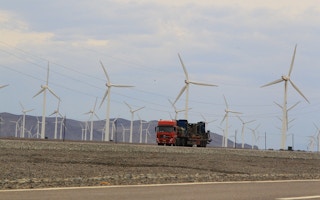International trade has boosted economic growth in many countries, especially those without abundant natural resources or fixed capital. In addition to creating opportunities for cross-border specialisation, trade has made it possible to import cheap consumer goods, intermediate inputs for manufacturing, and capital equipment.
This is especially true in Asia and the Pacific, which accounted for 35 per cent of global trade in 2020, up from 25 per cent a decade earlier.
Likewise, globalisation and open trade could play an indispensable role in saving the planet. Given the existential threat of climate change, environmental goods and services should be made widely available at affordable prices to support a rapidly greening world economy.
Imports of solar panels, wind turbines, and electric vehicles, along with services such as wastewater treatment, could also generate technological spillovers that stimulate and support the development of renewable energy sectors and clean industries domestically.
But overall progress has been slow. The lack of a collective commitment to liberalise trade in environmental goods and services, coupled with a rise in protectionist measures, will almost surely undermine mitigation and adaptation efforts. Global and regional cooperation is urgently required to agree on common principles for facilitating such trade and safeguarding supply chains.
The first challenge is to define an environmental good or service. The Asia-Pacific Economic Cooperation (APEC) agreed to a list of 54 environmental goods on which they would apply tariffs of 5 per cent or less. Yet the agreement has only a limited impact, owing to its voluntary nature and the relatively small number of products covered. Negotiations to conclude an Environmental Goods Agreement among a group of World Trade Organization (WTO) members have stalled.
“
Given the existential threat of climate change, environmental goods and services should be made widely available at affordable prices to support a rapidly greening world economy.
Of course, if governments want to expedite the green transition, they are free to lower tariffs on environmental goods (such as manufacturing equipment) unilaterally, in whatever way cuts domestic greenhouse-gas emissions most dramatically.
Their inclusion in international trade agreements, however, requires consensus on objective standards. Beyond the technical challenges of defining environmental goods, countries may seek to tailor specifications to protect their own producers.
The recent rise of competing industrial policies in both advanced and emerging economies creates some opportunities to disseminate environmental goods more widely and at lower prices. After all, subsidies for renewable-energy producers can increase investment in research and development, which may yield cost-reducing innovations.
For example, the price of solar modules has plunged, on average, to below $1 per watt for the world’s largest producers, including Germany, Japan, the United States, and the People’s Republic of China. The ability to import such cheap renewable technology makes the clean-energy transition more affordable for a broader range of countries.
But the huge challenges that such policies pose to climate action outweigh the benefits. According to the International Energy Agency, China’s share in all the components used to manufacture solar panels – such as polysilicon, ingots, wafers, cells, and modules – exceeds 80 per cent. This is largely a result of its cost competitiveness, with prices 20 per cent lower than in the US and 35 per cent lower than in Europe.
But much of the world cannot access cheap solar panels from China because of countervailing and anti-dumping duties imposed by its trading partners. While efforts to level the playing field between foreign and domestic producers are understandable and permitted under WTO rules, erecting trade barriers for environmental goods slows the green transition.
Moreover, other protectionist policies, like those that link domestic sourcing requirements to market access, may be even harder to justify on competitive grounds.
Imposing export restrictions on critical raw materials such as lithium, rare-earth elements, and chromium, all of which are in high demand as the energy transition gathers pace, is also unhelpful. Such restrictions, which include licensing requirements as well as export tariffs and bans, increased fivefold from 2009 to 2020.
Any reduction in the cross-border flows of these materials could significantly challenge the security of supply chains for green products. Moreover, trade fragmentation makes it more difficult for leading global companies to maximise their competitive and innovative potential, reducing opportunities to cut costs further.
And yet, relatively few international trade agreements include provisions to liberalise trade in environmental goods and services. The urgency of the climate crisis obliges the international community to be proactive in agreeing on the definitions of such goods and services and implementing practical measures to lower both tariff and non-tariff trade barriers.
These issues could be discussed at international forums such as the G20 and APEC, or as part of regional economic cooperation efforts like the Regional Comprehensive Economic Partnership or the Indo-Pacific Economic Framework.
Improving access to environmental goods and services can accelerate mitigation and adaptation efforts globally at a lower cost. So, rather than engage in protectionism, governments wishing to support domestic production of such goods are far better off subsidising research and development, which is permitted under WTO rules because it can help companies become more efficient and innovative.
At the same time, they must support the free flow of trade, because making these goods more widely available might be our best chance to solve the climate crisis.
Albert Park is Chief Economist at the Asian Development Bank. Jong Woo Kang is Principal Economist in the Economic Research and Development Impact Department at the Asian Development Bank.
Copyright: Project Syndicate, 2023.
www.project-syndicate.org



















